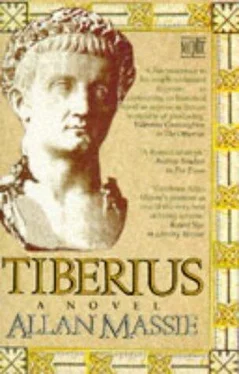Allan Massie - Tiberius
Здесь есть возможность читать онлайн «Allan Massie - Tiberius» весь текст электронной книги совершенно бесплатно (целиком полную версию без сокращений). В некоторых случаях можно слушать аудио, скачать через торрент в формате fb2 и присутствует краткое содержание. Жанр: Исторические приключения, на английском языке. Описание произведения, (предисловие) а так же отзывы посетителей доступны на портале библиотеки ЛибКат.
- Название:Tiberius
- Автор:
- Жанр:
- Год:неизвестен
- ISBN:нет данных
- Рейтинг книги:5 / 5. Голосов: 1
-
Избранное:Добавить в избранное
- Отзывы:
-
Ваша оценка:
- 100
- 1
- 2
- 3
- 4
- 5
Tiberius: краткое содержание, описание и аннотация
Предлагаем к чтению аннотацию, описание, краткое содержание или предисловие (зависит от того, что написал сам автор книги «Tiberius»). Если вы не нашли необходимую информацию о книге — напишите в комментариях, мы постараемся отыскать её.
Tiberius — читать онлайн бесплатно полную книгу (весь текст) целиком
Ниже представлен текст книги, разбитый по страницам. Система сохранения места последней прочитанной страницы, позволяет с удобством читать онлайн бесплатно книгу «Tiberius», без необходимости каждый раз заново искать на чём Вы остановились. Поставьте закладку, и сможете в любой момент перейти на страницу, на которой закончили чтение.
Интервал:
Закладка:
"One of Maecenas' parties?" I asked.
It wasn't, however, only there that Marcellus had encountered the conspirators. This I learned from my second source.
One day while I was preparing the case against Caepio I received a message which puzzled me. Its substance was that its author had information relating to the case which he could only give me in person; however, he was reluctant to approach me openly. Now of course such messages are common in such circumstances, and my first inclination was to ignore it: if a man is frightened to give information openly, it is likely that he is untrustworthy and his evidence tainted. Yet I had an instinct that it might be otherwise on this occasion. I therefore consented to a secret meeting.
This took place, by night, in the back room of a low tavern in the maze of little streets between the Campus Martius and the river. Following instructions, I presented myself there heavily cloaked. The tavern was clearly a disreputable place, frequented by the scum of the city, prostitutes of both sexes and their panders. I was indeed glad that my face was concealed, and for a moment I wondered if I had been foolish to go there. However, I gave the password to the proprietor and was shown into the back room as arranged.
There was a man lying on a couch with a curly-headed boy sitting on his lap. Neither moved when I entered and I thought I had been deceived and was ready to burst out angrily. Then the man sat up, pushing the boy off.
"Time's up, darling," he said. "Fetch us wine."
He unfolded himself and rose to his feet.
"You're earlier than I expected, my lord," he said.
"I'm punctual."
"Oh dear, you are stiff."
He spoke with a lisp; a Greek a few years older than myself with scented ringleted hair and an effeminate manner. He was sweating, and smoothed his tunic and then busied himself sitting me at the table. The boy brought in some wine and departed with a saucy look over his shoulder. I felt a little sick.
"My name's Timotheus," the man said. "I do a lot of work for the Princeps, though you won't have heard of me, and I have a problem which I would like to discuss with you. It concerns the case with which you are occupied."
He smirked and wriggled his shoulders.
"I asked you here because I wanted to keep things dark. I'm in a quandary. I'm the Princeps' own agent and the information I have is such as I frankly don't dare to give him. Do you begin to see?"
"No, I don't. Perhaps you should begin at the beginning and stop talking in riddles."
"Riddles are often all it's safe to talk in these days."
"Listen," I said, "I am prosecuting in the case you refer to. If you have information then I can compel you — painfully — to divulge it."
He sipped his wine and pushed the jug across the table to me. I was surprised to see that I had already drunk my first cup. It was a sweet wine with a touch of resin, the sort of thing Greeks prefer.
"That wouldn't be wise," he said. "The Princeps would like that even less. He wouldn't want it to be known he employs types like me. Besides, I must tell you, if only to secure my position, that we began our connection in circumstances he wouldn't want to be recalled. Frankly, my dear, I know too much. So why don't you come off your high horse, and listen like a good boy? I'll begin at the beginning as you suggest."
His manner disgusted me. I longed to have him whipped; and yet I was curious. I raised my cup to my lips and nodded.
He told his story in an affected manner, with many digressions. But its essence was simple. He was a spy whose especial talent was what he described as provocation. "When I get a whiff of disaffection, I fan it…" The Princeps had been suspicious of his colleague, Murena, and had conveyed his suspicions to Timotheus, commanding an inv estigation. Timotheus had there fore introduced his agent into the consul's house, as a servant, "A regular Ganymede, you understand" — he fluttered his eyelashes at me. "But of course servants, however sweet, can't find out everything, though I let the Princeps think that all my information came from the boy." It didn't. He had also recruited a young nobleman called Fannius Cotta, a cousin of Caepio's. From his manner of talking I had no doubt that this Cotta was the wretch's lover. Cotta — who must, I thought, be practically half-witted to have fallen in with Timotheus' suggestion — had encouraged his cousin and the consul in their treason, all the while reporting every detail to the Greek. But now Cotta had been arrested with the other conspirators; I knew that of course, for I had arranged to examine him. "So?" I said.
The Greek dabbed at his eyes, as though his narration had moved him. He wanted Cotta set free; that was obvious.
"I have only your word for the part he played," I said. "And in view of what you say about your relations with him, I see no reason why I should believe you."
"But I think I can persuade you," he said. "I have a letter written by a certain gentleman not unconnected with the Princeps. It is addressed to Cotta and unkind men might interpret it as offering encouragement to the conspirators."
"I see."
And I did. I had no doubt to whom he referred.
"Why don't you offer it to the Princeps?"
"Don't be silly, my dear. I wouldn't dare. For one thing, he would think it a forgery. For another, that wouldn't help my friend. And for a third, I'm a Greek, a poor freedman, and… well, we Greeks have always had dealings with the Persians, and you know the Persian way of treating the bearer of bad news. It would be as much as my life is worth. But it seemed to me, regarding the relationships within the imperial family, that it might be of some use to you…"
"I disapprove of the term, 'the imperial family'. Such a thing doesn't exist, and is offensive even as an idea."
"As you like."
"Do you have the letter here?" "Don't be silly. I have a copy.. "
"You speak confidently for a man in your circumstances."
He smiled. "That's your interpretation," and thrust his hand down into his tunic and produced the letter.
"This could be interpreted in more than one way," I said.
"Either way would be damning, wouldn't it? But you see my dilemma, which I'm now sharing with you. I want to save my friend, but I can't possibly pass on that letter to the Princeps."
"Isn't it your fault for having concealed that he was working on your behalf to provoke the conspiracy?"
"Perhaps, but there it is."
I was naive of course. I saw that at once. Cotta was clearly a genuine conspirator, and perhaps his relations with the Greek had developed out of the conspiracy. Nevertheless I couldn't but admire the adroitness of the Greek's plan. And the letter was certainly — if indeed in Marcellus' own hand — damning. I would be pleased to have it. Arrangements, satisfactory to all parties, could therefore be made. I indicated as much.
"But I must still interrogate Cotta," I said. "You understand that? Nevertheless…"
Fannius Cotta was a tall, well-built young man with big eyes and a loose mouth. Terror had unmanned him, rendering him alternately sulky and abject. Twice during our conversation he threw himself down on his pallet bed sobbing. He wore a short tunic and the sweat sparkled on the back of his thighs as his shoulders heaved. He promised that he could incriminate Marcellus still further, if that was what I wanted.
"You mistake me," I said. "I want to bring this thing to an end. One means of doing so would be for you to meet with an unfortunate accident."
He threw himself on the ground before me, grabbing my ankles and begging for mercy.
"Get up," I said. "Have you no dignity?"
It went against my inclination, but I made arrangements for his release. I knew that Timotheus would destroy the letter rather than produce it if I broke our agreement. Loathsome though he was, I also realised that he had sufficient intelligence to have prepared for himself a defence against any action I might take to incriminate him. But I made two conditions: Cotta must leave Italy for a space of five years. He must never communicate with Marcellus. I issued threats, though I knew I would soon have no means of enforcing them. But I was certain that Cotta was such a coward that he would not dare to defy me.
Читать дальшеИнтервал:
Закладка:
Похожие книги на «Tiberius»
Представляем Вашему вниманию похожие книги на «Tiberius» списком для выбора. Мы отобрали схожую по названию и смыслу литературу в надежде предоставить читателям больше вариантов отыскать новые, интересные, ещё непрочитанные произведения.
Обсуждение, отзывы о книге «Tiberius» и просто собственные мнения читателей. Оставьте ваши комментарии, напишите, что Вы думаете о произведении, его смысле или главных героях. Укажите что конкретно понравилось, а что нет, и почему Вы так считаете.












